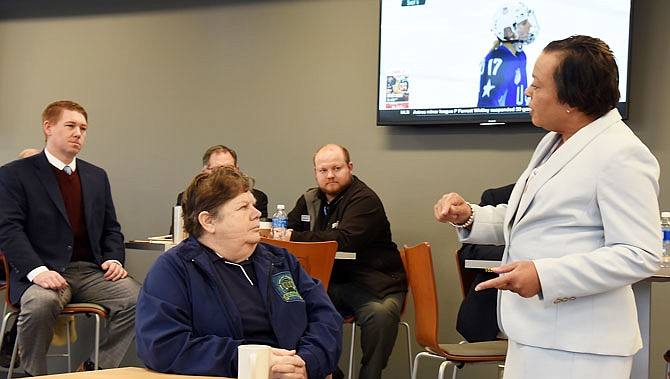When Jerald Woolfolk looks in her mirror each morning, she said Thursday, "I see Jerald Jones, a little black girl from Leland, Mississippi and I don't think I would be standing here before you if it had not been for that community."
Woolfolk, currently vice president for Student Affairs at the State University of New York, Oswego, was the second of two finalists for Lincoln University's presidential vacancy created when Kevin Rome moved to Fisk University in Nashville, Tennessee, on July 1.
The first finalist, William E. Hudson Jr., currently vice president for Student Affairs at Florida A&M University in Tallahassee, visited Jefferson City on Wednesday.
Speaking at the first of a day-long series of meetings with the general public and LU's faculty, staff, students, alumni and curators, Woolfolk said she wants to be Lincoln's next president "because I believe it's in that position, that I can make the greatest impact - particularly when it comes to student success (and) institutional success."
She noted she's worked in many areas of institutional leadership during her more than 30 years of higher education work, and said: "I've learned so much by being a trouble-shooter."
She said Lincoln - and schools like it around the country - "have been and always will be to provide access (and) success (and) availability, so that people can transform their lives."
Rome left Jefferson City after four years as LU's president.
When asked how long she might stay if the curators hire her as Lincoln's next president, Woolfolk said: "Wherever I end up, it's going to be my first (presidency) - and my last."
She said national data "tells us that the life of a university president is five to seven years. It's my opinion that in order to be really impactful and effective, presidents need to stay longer. It's hard to turn a corner in just two, three or four years. And I want to have results. I want to leave an institution much better than I found it."
Woolfolk said her management style is one of inclusion and understanding the strengths of a "team."
"I am not a person who says, 'Do it my way,'" she explained. "I value every voice. Everybody has a perspective."
She said she's an "enrollment manager by training," and said her research shows Lincoln needs to improve both its recruitment of students and their retention until they graduate.
Retention efforts, Woolfolk said, should follow a "strategic marketing, improvement and enrollment plan" based on a "deep-dive into the data" and a use of various services aimed at helping students do better in their classwork.
The recruitment work should start in Cole and surrounding counties, Woolfolk said, adding Lincoln needs to work continuously to be fully integrated with the community.
"We should be making a difference in this community," she said.
She has a strong commitment to the success of historically black colleges and universities, like Lincoln. But she said LU has a selling point like no other.
"One of the greatest things I see at Lincoln is the diversity," Woolfolk explained. "I think that needs to be one of the selling points. This will always be a historically black university, but it is perhaps the most diverse HBCU in the country.
"And at this particular time, as we are going through all these different issues in our country," she said, "what better way to promote Lincoln than having this diverse and inclusive community?"
Growing up, Woolfolk said, she didn't plan to go into education as a career, "but somewhere along the way, I was so influenced by the teachers around me."
The final realization came when she was earning her masters degree in counselor education at Iowa State University, Ames.
"That's when I really found myself," she told about three dozen people attending a breakfast meeting at The Linc. "I don't regret one moment that I've spent doing what I do - and I could not imagine doing anything else."
Woolfolk said Leland, in the Mississippi River Delta region of West-Central Mississippi, is one of the nation's poorest places.
But, starting when she was "probably 5," she said, "my dad, in particular, said, 'You're going to college.'
"We didn't even know what college was, and we surely didn't know that it cost money - but that's what he said, and you believed him," she said.
Her church family and her community also supported that goal, Woolfolk added.
"Most importantly, I share that story with you because that drives my passion for higher education," she explained. "That drives my passion to make sure that I do what I can do, to help students be successful.
"If I, this little black girl from Mississippi, whose father worked in the factory and whose mother worked in retail - if I can do these (academic) things, then I believe that anybody can do this, given the right opportunity and the right circumstances."
She earned a bachelors degree in psychology from Jackson State University in Jackson, Mississippi - where she later earned her doctorate in urban higher education.
In her first job after college, she went to the University of Arkansas-Pine Bluff - and stayed 17 years.
Woolfolk worked at Mississippi Valley State University in Itta Bena, Mississippi, for 13 years, then left for a position at City University of New York's College of Staten Island - only to be asked to return to Mississippi Valley after one year, and stayed another three.
She's been with SUNY-Oswego for four years.

